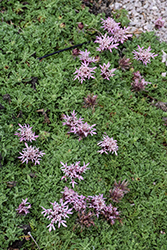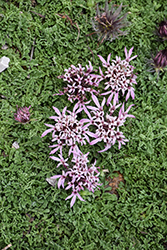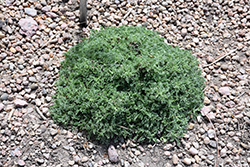It's all about ...
plants

Carpeting Pincushion Flower
Pterocephalus depressus
Plant Height: 2 inches
Flower Height: 3 inches
Spacing: 16 inches
Sunlight:
![]()
![]()
Hardiness Zone: 4a
Other Names: Moroccan Pincushion Flower
Brand: Plant Select
Description:
An unusual, drought tolerant groundcover with a low, evergreen mat of gray-green crinkled leaves; deep purple-red buds open to heads of silver-pink blooms, followed by attractive silver seed heads; tolerates light foot traffic; must have good drainage
Ornamental Features
Carpeting Pincushion Flower features showy rose pincushion flowers with silver overtones held atop the stems from late spring to late summer, which emerge from distinctive burgundy flower buds. Its attractive tiny crinkled lobed leaves remain grayish green in colour throughout the year. The silver fruits are carried on showy plumes with hints of tan, which are displayed in abundance from mid summer to mid fall.
Landscape Attributes
Carpeting Pincushion Flower is a dense herbaceous evergreen perennial with a ground-hugging habit of growth. It brings an extremely fine and delicate texture to the garden composition and should be used to full effect.
This is a relatively low maintenance plant, and is best cleaned up in early spring before it resumes active growth for the season. It is a good choice for attracting bees and butterflies to your yard, but is not particularly attractive to deer who tend to leave it alone in favor of tastier treats. It has no significant negative characteristics.
Carpeting Pincushion Flower is recommended for the following landscape applications;
- Mass Planting
- Rock/Alpine Gardens
- Border Edging
- General Garden Use
- Groundcover
- Naturalizing And Woodland Gardens
- Container Planting
Planting & Growing
Carpeting Pincushion Flower will grow to be only 2 inches tall at maturity extending to 3 inches tall with the flowers, with a spread of 20 inches. When grown in masses or used as a bedding plant, individual plants should be spaced approximately 16 inches apart. Its foliage tends to remain low and dense right to the ground. It grows at a medium rate, and under ideal conditions can be expected to live for approximately 10 years. As an evegreen perennial, this plant will typically keep its form and foliage year-round.
This plant does best in full sun to partial shade. It prefers dry to average moisture levels with very well-drained soil, and will often die in standing water. It is considered to be drought-tolerant, and thus makes an ideal choice for a low-water garden or xeriscape application. This plant does not require much in the way of fertilizing once established. It is not particular as to soil pH, but grows best in sandy soils. It is somewhat tolerant of urban pollution. This species is native to parts of North America. It can be propagated by division.
Carpeting Pincushion Flower is a fine choice for the garden, but it is also a good selection for planting in outdoor pots and containers. Because of its spreading habit of growth, it is ideally suited for use as a 'spiller' in the 'spiller-thriller-filler' container combination; plant it near the edges where it can spill gracefully over the pot. Note that when growing plants in outdoor containers and baskets, they may require more frequent waterings than they would in the yard or garden. Be aware that in our climate, most plants cannot be expected to survive the winter if left in containers outdoors, and this plant is no exception. Contact our experts for more information on how to protect it over the winter months.
This plant is not reliably hardy in our region, and certain restrictions may apply; contact the store for more information.


